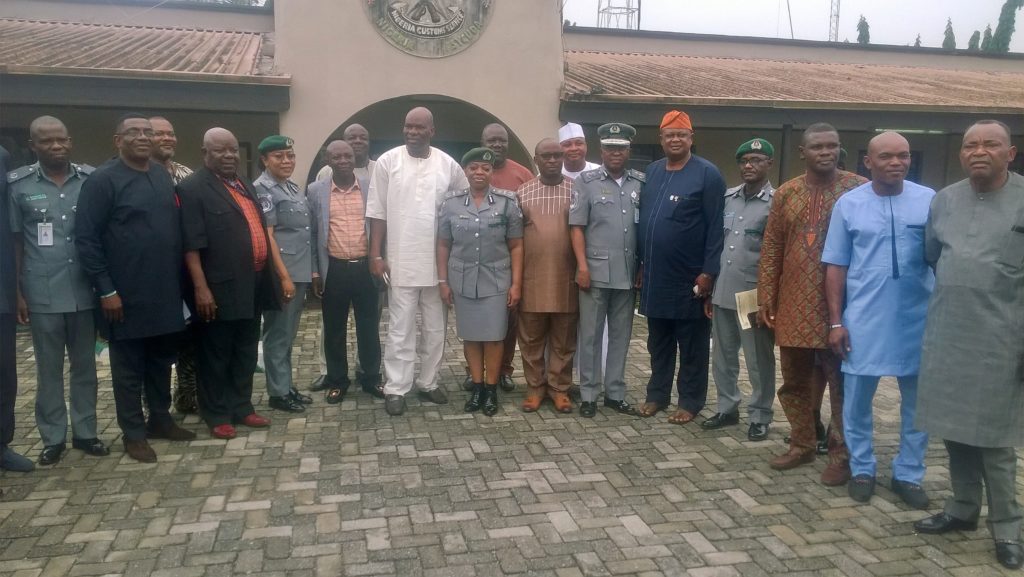…Advocates workable strategies to curb rice smuggling
The Association of Nigerian Licensed Customs Agents (ANLCA) has called on the Nigeria Customs Service (NCS) to consider re-opening of payment of duty on imported vehicles that have already find their way into the country through unapproved routes.
The National President of the association, Chief Tony Iju Nwabunike who made the appeal while on a courtesy visit to the Assistant Comptroller-General of Customs in-charge of Zone A, ACG Kaycee Ekezie at the Zonal Headquarters in Lagos on Friday however suggested that such payment should be made through a dedicated channel at the Federal Operations Unit (FOU) in conjunction with ANLCA so as to retrieve almost lost revenue as well as safeguard their members’ licenses from being continually hacked or misused.
Nwabunike who was represented during the visit by the National Vice President of ANLCA, Dr. Kayode Farinto also believe that smuggling was only a symptom of a problem stating that closing of a border would not solve smuggling of rice into the country.
“Rather, ANLCA requests that customs should intensify efforts to evolve workable strategy to curb smuggling while advancing increase production of rice locally”, he said.
Responding, the Assistant Comptroller-General in charge of Zone A, ACG Kaycee Ekezie while recalling that vehicle auctions by the service was now online observed that it was difficult to auction brand new vehicle as nobody would buy it at the value.
While agreeing to the fact that the Comptroller-General of Customs, Col. Hameed Ali (rtd.) was aware that there were vehicles that people buy not knowing that customs duty was not properly paid or not paid at all on them however advised that those people should write to the service notifying it of the status of their vehicles and that they would be allowed to come up and pay duty on such vehicles.
“We are appealing to you now, please, tell your members, if you buy a car and you find out or suspect it has not been properly cleared, please say so, you will be allowed to do so. You can write through me and I will pass it to them but you know that it will look somehow for us to go to the car stand and tell them go and pay, that means we are legalizing smuggling. Please beg them to stop.
“Customs has written its own position concerning these tariffs on cars, the CET says, traditionally that as it was with the customs, 20%. It is just because this policy that we are doing 35%. Even Picanto that I can put in my hand, before, you know it used to be 2.9 and below, engine capacity was 20%, then 3.0 upwards pays 35%. Then after that 35% for brand new car, you are seeing another 35% on it making 70%. That is the policy.
“If we don’t want used vehicles in this country, why don’t we make used vehicles to pay higher? Why don’t we even patronize the locally assembled cars? Why can’t we patronize Innoson since he produces all the brands?” she queried.
The ACG regretted that part of the problem was that the service was not always being carried along at the level of policy formulation only to be handed the policy for implementation after it must had been completed which left it with no option than to implement.
She however added that most times, the service on receiving the policy for implementation from the federal government always write its position on such policy which may or may not be considered.
“Like the auto policy, that one, whenever I remember it, it makes cry because I know that when I joined customs newly, if you want to buy a car, you just go to Tincan, that car park C, the importer is right there, you bargain. You might say oh, I am going to buy Honda, then you end up buying Corolla because everything is there and as you buy it, your people are there with their typewriters, within hours, your car is outside the gate. You have paid duty and you have released.
“What happened? How did it get to this that you bring in a car, it will take you one week? And what made all these importers run to the neighbouring countries? It is all policies. But I tell you again, these policies are not done to punish anybody, the policies are always to make the society better than it is, protect our young industries and look into areas we have not been looking into.
“The problem is not only with implementation but right from where the policies came from, you will see somersault otherwise why should somebody bring in an item that is supposed to be 10% and pay 5% or 0% duty on the item and then tomorrow, because customs is now pointing out that this is not supposed to be 0% or 5%, but 10%, then next tomorrow, there will be government waiver on it. Thank God the Ministry of Finance has said that there is no more waivers after the goods have arrived”, she added.
Send your news, press releases/articles to augustinenwadinamuo@yahoo.com. Also, follow us on Twitter @ptreporters and on Facebook on facebook.com/primetimereporters or call the editor on 07030661526, 08053908817.

